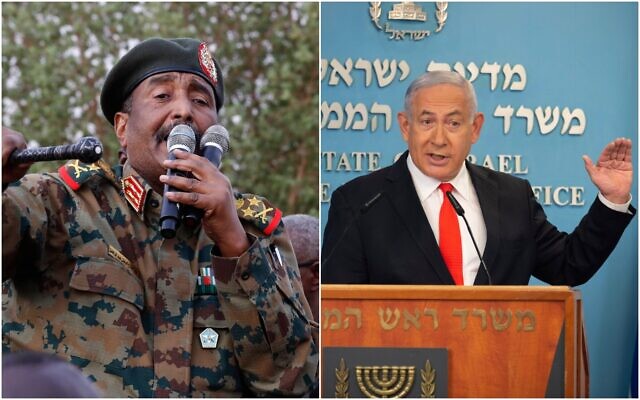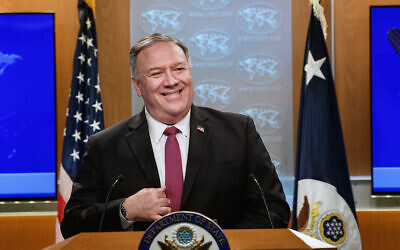Announcement to be made over weekend or early next week, reports say, following trip by Israeli-US delegation to Khartoum

Israel and Sudan will announce the establishment of diplomatic ties over the weekend or early next week in a US-brokered deal, Hebrew media reported Thursday, citing officials involved in the negotiations.
The announcement will likely come after a phone call between US President Donald Trump, Sudan’s transitional leader Lt. Gen. Abdel Fattah al-Burhan, Sudan’s Prime Minister Abdalla Hamdok and Prime Minister Benjamin Netanyahu, according to the Walla news site.
The breakthrough comes after a high-level Israeli-US delegation reportedly traveled to Sudan on Wednesday for covert negotiations on the normalization of ties between Khartoum and Jerusalem.
According to Israel Hayom, the Wednesday trip in a business jet — which made a highly unusual direct flight from Tel Aviv to Khartoum, and back — saw officials from the Mossad intelligence agency and Prime Minister’s Office visit Sudan for talks. During the meetings with their Sudanese counterparts, the senior officials reached a final agreement on forging Israel-Sudan ties, the report by the pro-Netanyahu daily said, without elaborating on the terms.
The Walla news site named the Israeli officials as Acting Director General of the Prime Minister’s Office Ronen Peretz and Netanyahu’s envoy to the Arab world “Maoz.” They were joined by senior US defense official Miguel Correa and Aryeh Lightstone, an adviser to US Ambassador to Israel David Friedman, according to Walla.
The delegation met with Burhan and other senior Sudanese officials, the report said.
Talks between the US, Israel and Sudan reportedly continued on Thursday.

On Wednesday, US Secretary of State Mike Pompeo said he hoped Sudan would soon recognize Israel, as Washington moved to strike the Arab country from a list of state sponsors of terrorism. Pompeo said that the United States wanted every nation “to recognize Israel, the rightful Jewish homeland, to acknowledge their fundamental right to exist as a country.”

“We are working diligently with them to make the case for why that’s in the Sudanese government’s best interest to make that sovereign decision,” Pompeo told reporters. “We hope that they’ll do that, and we hope that they’ll do that quickly.”
Sudan was designated a state sponsor of terrorism in 1993 after then-dictator Omar al-Bashir welcomed Al-Qaeda founder Osama bin Laden.
To exit the blacklist, which has severely impeded investment, the cash-strapped nation agreed to pay $335 million to survivors and victims’ families from Al-Qaeda twin bombings in 1998 of the US embassies in Kenya and Tanzania.
Pompeo said that the United States had “begun the process” of the delisting. Congress then has 45 days in which it can raise objections.
“We think that there will be enormous bipartisan consensus that that’s the right thing to do,” Pompeo said.
Speculation regarding a decision from Sudan to normalize ties with Israel got a boost Wednesday when a flight tracking site recorded a mysterious unregistered business jet that traveled directly from Israel to Sudan and back on Wednesday.
Tel Aviv to Khartoum, Sudan bizjet – this morning. 9H-VFJ
This is the 2nd known direct flight between the two countries (1st one, in reply)
It’s been reported Sudan may be next to normalize relations w Israel, following Trump removing Sudan from state sponsors of terrorism list pic.twitter.com/zRT8cTKhUz
— avi scharf (@avischarf) October 21, 2020
Regional Cooperation Minister Ofir Akunis told Israel’s Army Radio on Wednesday that an announcement on ties would likely come before the US election. “I have a reasonable basis to believe that the announcement will come before November 3. That… is what I understand from my sources,” he said.
Intelligence Minister Eli Cohen echoed that sentiment, telling Channel 13 that Jerusalem was “very close to normalizing ties with Sudan.”
US Ambassador to Israel David Friedman expressed certainty that there were several Arab countries that will normalize with Israel.
“There will be more countries that are in the Arab League that will normalize and make peace with Israel, I have no doubt it is a certainty. How many, in what order, I think everyone will have to wait and see,” he told Israel Hayom.
The United Arab Emirates and Bahrain have both normalized relations with Israel in recent weeks.
Sudan is currently ruled by a fragile transitional Sovereignty Council run by al-Burhan, who has reportedly been generally supportive of ties with Israel. His civilian counterpart, Prime Minister Abdalla Hamdok, however, has been far more hesitant.
Al-Burhan is scheduled to hand over control of the Sovereignty Council to Hamdok in 2022. But the normalization question has reportedly driven a wedge between the two leaders, with al-Burhan increasingly frustrated by Hamdok’s insistence that the transitional government has no mandate to handle the normalization question at this time.
Israeli officials have long expressed a wish for better relations with Khartoum. But Sudanese officials had been rejecting the US effort to tie Khartoum’s removal from the blacklist to its normalizing ties with Israel.
As reported by The Times of Israel
